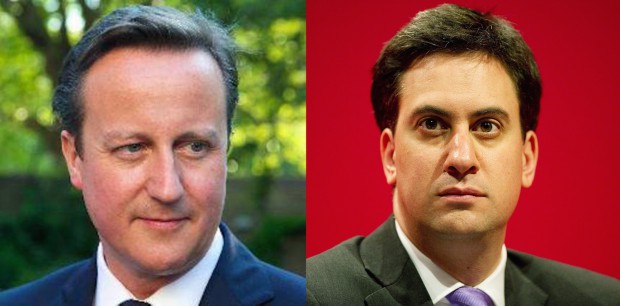27 November 2014
What should the next Westminster government do differently?

Possible Prime Ministers – Tories' David Cameron and Labour's Ed Miliband
AS WE head towards the end of the year, what is clear from all of our MPs’ travails in London is that all thoughts in Westminster are on the May general election.
The closeness of the polls, which continue to just about put (British) Labour as the largest party, make for an atmosphere of uncertainty, especially with unknown factors such as UKIP to the right and the Greens to the left, and a rise in support for the SNP and pro-independence movement in Scotland.
What is certain is that every political decision or statement is being made with an eye to that narrow margin and possible alliances around who will form the next British Government.
The outcome of that will, of course, be a key factor in progressing the Irish Peace Process.
It’s been well-rehearsed that, over the last few years, this current Tory-led Government has not shone as an example of imaginative, bold leadership in terms of the political process.
Far from grasping the chance to really drive forward the Good Friday Agreement, and making it clear that unionist naysayers would not be allowed to dictate the pace, the opposite has been the order of the day.
The British Government’s mantra is that this is not their problem, that it is a matter for the parties in Ireland to decide. This is wholly disingenuous and false.
If the British Government really wanted to have nothing to do with things, they could call a Border poll and let the people decide. The truth is, far from absenting themselves, they are very much involved in allowing a unionist agenda to predominate.
They are very active in preventing the outstanding matters of the Good Friday Agreement from being taken forward and they are very engaged in accommodating unionist demands which fall outside the Good Friday Agreement framework.

So what should any future government do differently?
Like the situation in 1997, it took a change of government to actually break out of the logjam. That imaginative thinking contributed to achieving the Good Friday Agreement. Today, there are many things a British Government could actively do.
First, there are the key matters in the Agreement which have been reneged upon. These include an Irish Language Act, a Bill of Rights and crucial bodies such as the Civic Forum which could bring much-needed pro-change momentum from a range of groups, from business to trade unions.
The next British Government could work closely with the Irish Government (and the Assembly) to ensure the development an all-island Charter of Rights, create a North/South Consultative Forum aimed at civic societal engagement, and to review and strengthen the North-South implementation bodies.
As we face economic challenges North and South, greater co-operation across our island makes sense in both jurisdictions.
A strong alternative to the current austerity mantra would be to allow greater fiscal powers for the North, alongside this greater all-Ireland co-operation. Directing investment and attracting inward investment to stimulate growth, rather than the regressive drag of cuts, would be an attractive manifesto proposition which could prove hugely popular.

In the context of Scotland’s referendum, the merits of greater devolved powers are clearly on the table now. A future Westminster Government should clearly commit to this. The political engagement created by the Scottish independence referendum underlines the merits of committing to a Border poll in the not-too-distant future (as also envisaged in the Good Friday Agreement).
A future British Government could come out firmly in support of the Haass/O’Sullivan compromise proposals, in contrast to the failure to do so at the beginning of this year, as a framework for taking forward the issues of the past, flags and parades. And, of course, a proper independent inquiry into the murder of Pat Finucane should also happen, as the British Labour Party have already committed to if returned to power.
And a future British Government should look at the East/West dimensions and particularly how to engage the Irish Diaspora across the country, who have a particular role to play in contributing to the process.
In the final analysis, any future government in Britain should make crystal clear it stands firmly with the pro-Agreement majority, where it should be, and pledge to proactively defend and extend the Peace Process and progressive change.
Follow us on Facebook
An Phoblacht on Twitter
Uncomfortable Conversations

An initiative for dialogue
for reconciliation
— — — — — — —
Contributions from key figures in the churches, academia and wider civic society as well as senior republican figures





